合作原则与关联理论之对比分析
从合作原则和关联理论解读赵本山春晚小品的幽默性

。纛 |
李 永 宏 ( 州师 范大 学 外语 教 学部 贵 州 贵 阳 贵
纛 溢穗 | 京
500) 5 0 1
从 合 作 原 则 和 关 联 理 论 解 读 赵 本 山 春 晚 小 品 的 幽 默 , l 生
中 圈分 类号 : 0 H3
文献标 识码 : A
基本理l 合作原则和关联理论来分析 论: 赵本山小品的幽默语言 探究语用 祝律与幽默的 关系。 使人们 解赵本山小品幽默的语。 。
用意 义 誊 。 .l 一 。 ¨- - - 。≯ 曩 : 。1 _. … _ _
关键 词 : 晚 幽 默 i 作原则 . 联 理论 春 合 关
囊
-
: 。一 i
ቤተ መጻሕፍቲ ባይዱ
i :
量 的准 则指 话 语提 供 充分 而不 多 余 的信 息 当话语 故 意没 引言 春 晚已 经是 十 几亿 中 国人不 可 缺 少 的一道 年 夜 大 餐 .受 中 有 尽 量提 供 对方 所需 要 的信 息 或提 供 了 多余 信 息时 .会 导致 幽 国 传统 历 史 和 民族 特 色的 影 响 。 成 了中 国特 色 的 文化 现 象 . 形 其 默 的产生 。 比如 , 赵本 山 的小 品 《 在 送水 工 》 , 中 当高 秀敏 没有 告 受 中 国 老百 姓 的欢 迎 程度 和 广度 是 不 言而 喻 的 :有 人 说 没有 赵 诉 他 儿子 ( 范伟 扮演 ) 的继 父 ( 本 山扮 演 ) 他花 二 十元 钱雇 他 赵 是 本 山 . 晚就 不 叫 春 晚了 。 见 赵本 山 的小 品对 中 国人 的影 响力 的 . 春 可 范伟 把 贵重 的 大衣 和几 千元 送 给赵 本 山做 礼 物 时 . 本 山毫 赵 之 大 , 为老 赵 的 小 品 。 处 充 满 了 幽默 和 哲 理 , 因 处 以至 于 其 小 品 无 推 辞的 接受 了 。 这时 高秀敏 急 了 。 道 : 给你 啥你就 要啥 呀 。 吼 “ 你 中的许 多 经 典 台词成 为当 年 度 的流 行语 .引领 中 国的 时 尚和 潮 真 不把 自己 当外人 了 , 范 伟很 生气 地对 高 秀敏 嚷道 :你 干 嘛和 ” “ 流 。这 不 仅 是 因为 老 赵本 身 有 运 用语 言 的 天赋— — 在 特定 的情 我 爸 那样 说话 , ”赵本 山也 回应 : 你干 嘛 和我 妈那 样 说话 ,噢 。 “ 景 下 创 造 小 语 境 下 的 幽 默 .更 有 在 大 语 境 下 创 造 幽 默 的 能 呃 一 你妈 。” 因 为高 秀敏事 先没有 把 赵本 山不是 他继 父这一 实 是 力— — 在 中华 民族特 殊 文 化 ( 大语 境 ) 下人 们所 形 成 的 共 同 的大 情 告诉 范 伟 ( 就是 没有 给听话 人范 伟提 供足 够 的信 息 ) 违反 了合 。 从 进 文 化 和 共 同 的心 理特 征 的基 础 上 .他 和观众 在 交 流 中共 达 到 了 作 原则 . 而 将 听话人 范伟 误 人歧 途 . 而 引 出 了赵本 山后来 说 大 语 境 下 的最 佳关 联 的语用 效 果 难 怪 人 们说 老 赵 去香 港 和 美 出 “ 妈 ” 我 那样 令人 捧 腹 的话来 如 果高 秀 敏事 先把 实 情告 诉 了 国演 出并 没 有 得 到观 众 的好 评 .因为 他 的表 演 很 难 和没 有 共 同 范伟 。 不会 引 出后来 范伟 和赵本 山对话 所给 听众产 生 的幽默 感 就 文 化 背景 的 观众 达 到最 佳关 联 的语 用效 果 。 了。 那 么 什 么 叫幽 默 呢 ?Hu u 来 自拉 丁语 , 意 指 “ mo r 原 液体 ” 。 f ) 的 准则 的违反 与幽 默 的产生 - 质 1 6世 纪 . 琼 生 (0O n ta ) “ u u ” 人 艺 术 领 域 , 人 物 本 B ro ah n把 h m0 r引 指 质 的 准 则 指 话 语 内 容 是 真 实 的 . 当 说 话 人 故 意 违 反 质 量 准 的滑稽 特性 到 l 8世纪 初 才演 变 成现 代 意义 上 的 以诙谐 的形 式 则 , 用 夸 张 、 语 、 运 反 隐喻等 修辞手 段 , 说一 些 与事实不 符 的话 时 . 来 表 现具 有美 感 意 义 内容 的美 学 术语 1 2 9 4年林 语 堂先 生 第 一 便会 在一 定 程度 上产 生幽 默效果 次 将 英 语 “ u u ” 成 “ 默 ”从 广 义 上 讲 . 交 际 过 程 中 能 引 h no r译 幽 , 在 比如 :0 0年 春 晚 《 21 不差 钱 》 小 品一 开 始 。 本 山 回身 挂 满 , 赵 人 发 笑 或使 人感 到有 趣 的语 言 或行 为 就 叫幽 默 。 幽 默 的产 生一 了大 蒜 和野 山鸡 等带着 鸭蛋 到 了铁岭 最贵 的一 家饭 店去 宴请 “ 星 方 面 离不 开 语 言本 身 的属 性 .另一 方 面离 不 开 特定 的客 观 条件 光 大道 ” 主持 人 毕 福剑 时 . 到 饭 店 的 门牌 上 写 着. 格 兰情 的 看 “ 苏 和 背景 这 些 语言 外 的 因素 .以下 我 们 从语 用 的 角度 来 分 析 一下 调” 的名 字 , 赵本 山 故意 读成 了“ 格 兰调 情 ” 让 大 家哄 堂 大笑 。 苏 . 赵 本 山的 幽 默语 言是 如何 产生 的 紧接 着小 沈 阳扮着 七分 裤轻 盈 的步 出舞 台 。 对赵 本 山说 : 对不起 “ 合 作 原 则 与 幽 默 的 产 生 大爷 ,我 们 是高 档 酒店不 收农 副产 品. 本 山说 : 我们 是 吃饭 ”赵 “ 美 国 哲 学 家 Gr e认 为 . 所 有 的 语 言 交 际 活 动 中 为 了 达 到 的 , 说 姑娘 呀 ,我 们这 顿饭非 常重 要 。 i e 在 我 ”大 家捧腹 大笑 。 赵本 山 特 定 的 目的 . 话人 和听话 人 之 间存 在 着 一种 默 契 . 种 双 方都 给鸭 蛋鼓 劲 时说 。 毕 老师来 了要 好好 表现 。 说 一 “ 我都 培养 你 四十多 年 应 该 遵 守 的 原 则 , 称 这 种 原 则 为 会 话 的 合 作 原 则 (C o eaie 他 op rt 了 , , 蛋说 :我 才多 大呀 ” 赵本 山说 , 我还 培养你 爸三 十多 年 v ”鸭 “ , “ P ic l. r ie n p 简称 c ) 体些 说 , P. 具 合作 原 则 便是 要求 每 一个 交 谈 参与 呢。”当毕 福剑来 找赵铁 柱时 , 赵本 山 指着 鸭蛋说 :你 找对 了 。 “ 这 者 在整 个 交 谈 过 程 中所说 的话 符 合 这 一 次 交谈 的 目标 或 方 向 就 是 赵铁 柱他 爹 ” 。以上 赵本 山说 的“ 苏格 兰调 情 . 说 姑娘 呀 . 我 正是 交 谈 者 的这 种合 作 使得 他 们 能够 持 续 地进 行 有 意 义 的语 言 培 养 你三 十 多年 了 , 是 赵铁 柱 他 爹 ,和 小沈 阳说 的“ 收 农副 这 ” 不 交 际 。 合 作 原则 这条 根 本原 则可 以具 体体 现 为 四条准 则 : 产 品 ” 是故 意 违反 了 质量 准 则— —运 用 夸 张反 语 与事 实不 符 . 都 1 量 准 则f u ni ai 使 自己所 说 的 话达 到 交谈 的现 使 幽 默感 顿然 产生 。 . 数 Q a tym xm 1 t 实 目的 所要 求 的 详尽 程 度 :不 能 使 自己所 说 的话 比所要 求 的更 f 关系 准则 的违 反与 幽默 的产 生 -) - 详尽。 关 系 准则 : 话要 切 题 , 说 不说 和 话 题无 关 的话 。 如果 违 反这 2质 量 准则 (u lymai 。不 要 说 自己认 为是 不 真实 的话 ; . Q ai xm1 t 准则 , 方在说东, 一 另一 方 却 在道 西 , 或一 方 所 答 非 另一 方 所 不 要 说 自己缺 乏足 够证 据 的话 问。 常会 产 生 幽默 。说话 人有 时会 利用 同音异 义 或一词 多义 有意 3关 联准 则 ( lt nma i 说 话要 贴切 . . Reai xm) o 地误 解别 人 的意 思 。 势必 引出 滑稽 可笑 的结果 。 4方 式 准 贝 ( a n r a i ) 避 免 晦 涩 的 词 语 ; . ⅡM n e m m 。 x 避免 歧 义 : 比如 在 赵本 山 的小品 《 不差 钱》 , 本 山 向服 务员小 沈 阳点 中 赵 说 话要 简 洁 , 避免 赘述 : 话要 有 条理 。 说 了一 道 菜 “ 鸡 炖蘑 菇 ” 说 : 这 有 一个 菜 了 . 小 后 “ 来笨 蛋 。 沈 阳 ”小 但 这 四 条准 则 毕竟 是 几 条 约定 俗 成 的规 约 .不 同于严 格 的 说 : 说谁 笨 蛋 呢?…‘ 是 , “ 不 我说再 煎一 个笨 鸡蛋 ” 在 这里 赵本 山 。 语 言规 则 , 不 是 绝对 不 可违 反 的 。事 实 上 。 些 规约 常 常 被违 故意 把笨 鸡 蛋说 成是 笨蛋 , 离 了 主题 。 并 这 偏 又好 像在 骂小 沈 阳, 顿时 反 , 是 由于违 反 了这 些 准则 有 时 才产 生 了会 话 含 义 . 达 到 幽 产生 了幽 默感 在 2 1 辽 宁卫 视 小 品《 正 才 0 0年 就差 钱》 , 赵本 山 中 当 默 的效 果 。下 面从 合作 原 则 的 四个 方 面 和关 联 理论 来 分 析 赵本 费尽 心 思从 毕 福剑 哪 里把 送 给毕 福 剑作 为 礼 的一万 元 钱讨 回来 山 春 晚小 品 的幽 默语 言 时, 赵本 山高兴 的 说 : 回来 了 。 ” 时毕 福剑 听 了不 惑 的 问 : 什 “ 这 “ ( 1 的准则 的 违反 与幽 默 的产 生 一 量 么 回来 了?” 。赵 本 山马上 说 : 噢 。 “ 我说人 都 回来 了。” 春 晚小 在
合作原则与关联理论对幽默生成机制的比较研究
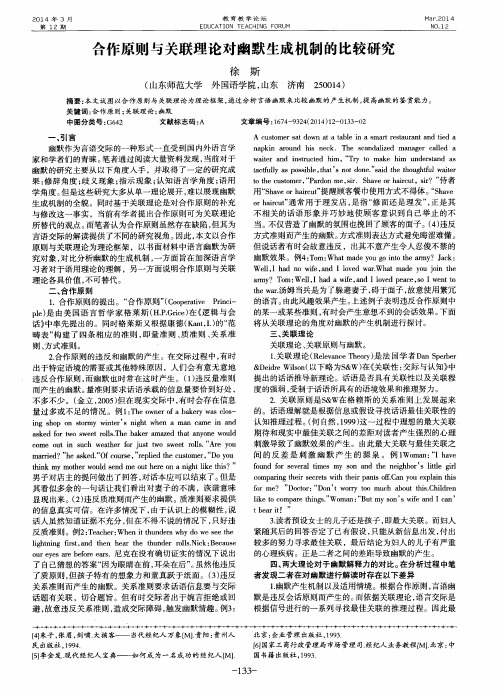
a my r ?T o m: We l l , I h a d a wi f e , a n d I l o v e d p e a c e , S O 1 we n t t o
三、 关联 理论 关 联理 论 、 关 联原 则 与幽 默。 1 . 关 联 理论 ( R e l e v a n c e T h e o y) r 是法国学者D a n S p e r b e r & D e i d r e Wi l s o n ( 以下略为S & W) 在《 关联性 : 交际与认 知》 中 提 出的话语 推 导新 理论 。话 语是 否具 有 关联 性 以及关 联 程 度的强弱 , 受制于话语所具有的语境效果和推理努力。 2 . 关联原则是S & W在 格 赖 斯 的 关 系准 则 上 发 展 起 来 的。话语理解就是根据信息或假设寻找话语最佳关联性的 认知 推理 过程 。 ( 何 自然 , 1 9 9 9 ) 这~ 过程 中理想 的最 大关 联 期待和现实中最佳关联之间的差距对读者产生强烈的心理 刺激 导致 了幽默效 果 的产生 。由此最 大 关联 与最 佳关 联 之 间 的反差 是 刺 激 幽默 产 生 的源 泉 。例 1 wo m a n : “ I h a v e
A c u s t o me r s a t d o wn a t a t a b l e i n a s ma r t r e s t a u r a n t a n d t i e d a n a p k i n a r o u n d h i s n e c k . Th e s c a n d a l i z e d ma n a g e r c a l l e d a wa i t e r a n d i n s t r u c t e d h i m ,“ T y r t o ma k e h i m u n d e r s t a n d a s
礼貌原则和情景喜剧中的幽默
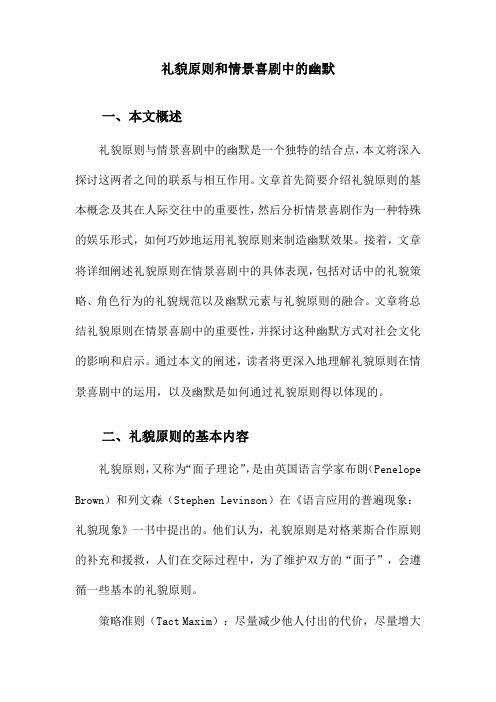
礼貌原则和情景喜剧中的幽默一、本文概述礼貌原则与情景喜剧中的幽默是一个独特的结合点,本文将深入探讨这两者之间的联系与相互作用。
文章首先简要介绍礼貌原则的基本概念及其在人际交往中的重要性,然后分析情景喜剧作为一种特殊的娱乐形式,如何巧妙地运用礼貌原则来制造幽默效果。
接着,文章将详细阐述礼貌原则在情景喜剧中的具体表现,包括对话中的礼貌策略、角色行为的礼貌规范以及幽默元素与礼貌原则的融合。
文章将总结礼貌原则在情景喜剧中的重要性,并探讨这种幽默方式对社会文化的影响和启示。
通过本文的阐述,读者将更深入地理解礼貌原则在情景喜剧中的运用,以及幽默是如何通过礼貌原则得以体现的。
二、礼貌原则的基本内容礼貌原则,又称为“面子理论”,是由英国语言学家布朗(Penelope Brown)和列文森(Stephen Levinson)在《语言应用的普遍现象:礼貌现象》一书中提出的。
他们认为,礼貌原则是对格莱斯合作原则的补充和援救,人们在交际过程中,为了维护双方的“面子”,会遵循一些基本的礼貌原则。
策略准则(Tact Maxim):尽量减少他人付出的代价,尽量增大对他人的益处。
这一准则强调了在交流中要考虑对方的利益和感受,尽量避免给对方带来不必要的麻烦或损失。
慷慨准则(Generosity Maxim):尽量减少对自己的益处,尽量增大自己付出的代价。
这个准则鼓励我们在交流中表现出大方和慷慨,愿意为对方付出更多。
赞扬准则(Approbation Maxim):尽力缩小对他人的贬损,尽力夸大对他人的赞扬。
在交流中,我们应该多给予对方肯定和鼓励,避免批评和指责,以维护对方的自尊和面子。
谦逊准则(Modesty Maxim):尽力缩小对自己的赞扬,尽力夸大对自己的贬损。
这一准则鼓励我们在交流中保持谦虚的态度,不要过分夸大自己的能力和成就。
一致准则(Agreement Maxim):尽力减少双方的分歧,尽力增加双方的一致。
在交流中,我们应该尽量保持与对方的观点一致,避免产生冲突和分歧。
合作原则与关联理论在分析会话含义中的应用
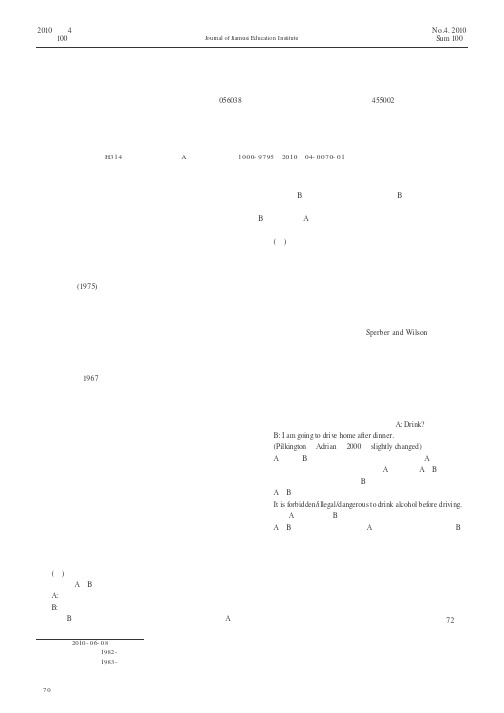
合作原则与关联理论在分析会话含义中的应用程洪梅胡淑华(河北工程大学文学院河北邯郸056038;安阳师范学院外国语学院河南安阳455002)摘 要:基于合作原则、会话含义与关联理论的基础上,本文作者试图分析会话含义的理解过程。
文中强调了交流中会话含义的重要性和推理过程的重要性。
在日常交流中,由于种种原因,说话人会故意迂回间接地表达自己的意图。
在这种情况下,话语的字面意义就不同于话语的暗含意义。
因此,如何理解并推断话语的暗含意义成为成功交际的关键。
关键词:合作原则;关联;会话含义中图分类号:H314文献标识码:A文章编号:1000-9795(2010)04-0070-01在人们的日常生活中,交流是非常重要的。
通过交流一方面说话人能传达信息和自己的意图,另一方面,听话人能获得并理解听话人传达的信息和意图。
如果交流双方想要成功地交流,双方都需要做出努力。
我们通常认为,在交流中,说话人会提供足够的信息;认为他们会讲事实,会尽量清楚地表达自己的意图。
但是事实上,在日常生活中,因为各种各样的原因,说话人可能会无意中违背会话原则,迂回间接地表达自己的意图。
一、合作原则与会话含义格莱斯(1975)认为交流是一系列相互关联的话语。
为了推进谈话的顺利进行,交流的双方都需要做出努力。
在某种程度上,交流的一方听出了谈话的意图,或者说是交流双方都能接受谈话的内容和谈话发展的方向。
谈话的方向可能在谈话一开始就确定了,也可能会随着谈话发展。
因此需要有一个共同的原则要交流双方去遵守,这就是合作原则。
格莱斯进一步把合作原则分成四个准则,包括质的准则、量的准则、关系准则和行为准则。
格莱斯在1967年第一次提出了会话含义的概念。
他认为,当说话人违背了合作原则中的一个准则的话,就产生了会话含义。
格莱斯提出会话含义,意在提出系统化的语言使用理论来促进日常交际。
关于会话含义理论,格莱斯指出,重要的一点就是会话中所说的意义和所暗含的意义之间的差别。
合作原则和关联理论对修辞格解读的对比——分析情景喜剧《老友记》
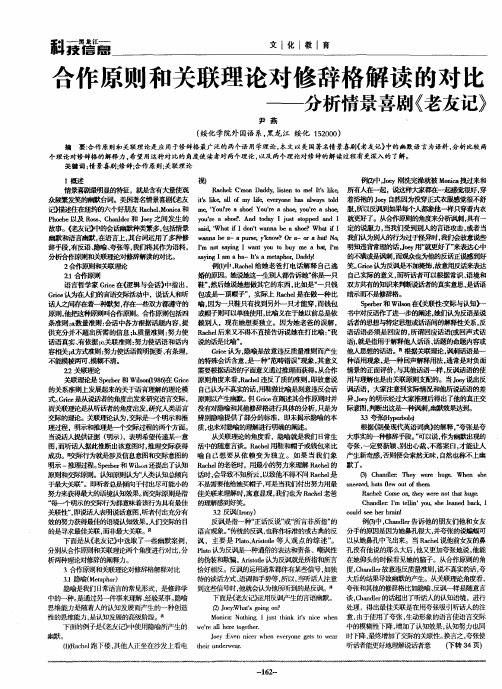
美国情景喜剧《老友记》中幽默语的对比分析:合作原则与关联理论的开题报告

美国情景喜剧《老友记》中幽默语的对比分析:合作原则与关联理论的开题报告一、选题背景及意义《老友记》是一部在全球范围内非常受欢迎的情景喜剧。
该剧中的幽默语言具有很高的表现力和艺术价值,引起了人们的广泛关注。
本文旨在通过对《老友记》中幽默语言的对比分析,深入探讨其中蕴含的合作原则与关联理论,进一步挖掘语言运用背后的文化内涵,探究人际交往与情感沟通间的关系。
二、理论探讨合作原则和关联理论是人际交往与情感沟通的重要理论基础之一。
合作原则指的是在交际过程中,彼此应尽可能地遵循和维持和谐、和睦的关系,不损害彼此的利益,并尽可能达到效果最大化的交际理念。
在《老友记》中,各个角色在日常生活中相互协作,提供帮助,分享快乐,体现了合作原则的重要性。
关联理论是指人们在交际过程中,通过语言交流来构建自我形象和他人对自己的印象,以及在某种社会关系的框架下,对话中涉及的主题和范畴进行选择的原则。
在《老友记》中,角色之间的语言交流不仅是情感表达的工具,还表现了不同性格、文化背景和价值观的差异,与情感交往产生密切关系。
三、方法本文将从两方面分析《老友记》中的幽默语言。
一方面,通过对台词的具体分析,挖掘其中的搞笑元素,探究所用言语的背后含义,并分析人物角色的幽默个性。
另一方面,通过对幽默语言中的文化元素进行挖掘,并运用人类学和社会心理学的知识,分析其中蕴含的文化内涵和人际交往的特殊性,探究文化与语言的互动关系。
四、预期结果通过对《老友记》中的幽默语言进行研究,本文预计可以深入探讨其中蕴含的合作原则与关联理论的作用,从而更深刻地理解人际交往和情感沟通的原则和根据。
同时,我们也能够更加深入地了解文化与语言运用的关系,对跨文化沟通有更加清晰的认识,提高人际交往水平和文化素养。
合作原则与关联原则
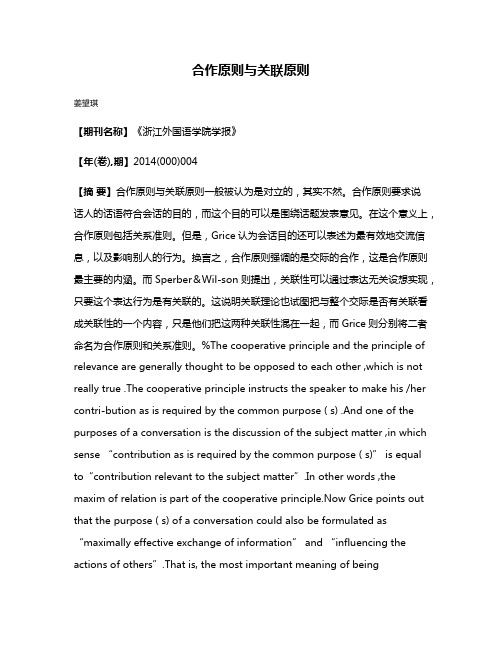
合作原则与关联原则姜望琪【期刊名称】《浙江外国语学院学报》【年(卷),期】2014(000)004【摘要】合作原则与关联原则一般被认为是对立的,其实不然。
合作原则要求说话人的话语符合会话的目的,而这个目的可以是围绕话题发表意见。
在这个意义上,合作原则包括关系准则。
但是,Grice认为会话目的还可以表述为最有效地交流信息,以及影响别人的行为。
换言之,合作原则强调的是交际的合作,这是合作原则最主要的内涵。
而Sperber&Wil-son则提出,关联性可以通过表达无关设想实现,只要这个表达行为是有关联的。
这说明关联理论也试图把与整个交际是否有关联看成关联性的一个内容,只是他们把这两种关联性混在一起,而Grice则分别将二者命名为合作原则和关系准则。
%The cooperative principle and the principle of relevance are generally thought to be opposed to each other ,which is not really true .The cooperative principle instructs the speaker to make his /her contri-bution as is required by the common purpose ( s) .And one of the purposes of a conversation is the discussion of the subject matter ,in which sense “contribution as is required by the common purpose ( s)” is equal to“contribution relevant to the subject matter”.In other words ,the maxim of relation is part of the cooperative principle.Now Grice points out that the purpose ( s) of a conversation could also be formulated as “maximally effective exchange of information” and “influencing the actions of others”.That is, the most important meani ng of beingcooperative in the Gricean sense is being helpful to communication ,or being communica-tively cooperative .On the other hand ,relevance theorists ,Sperber&Wilson ,argue that relevance could be a-chieved by expressing irrelevant assumptions as long as this expressive behavior is relevant , which suggests that they also try to make it part of the meaning of relevance being relevant to the whole communication .How-ever,Sperber&Wilson mix the two types of relevance ( relevance to a topic and relevance to the whole com-munication),while Grice separates them into the maxim of relation and the cooperative principle .And this is an important difference between them .【总页数】7页(P1-7)【作者】姜望琪【作者单位】北京大学外国语学院,北京100871【正文语种】中文【中图分类】H030【相关文献】1.合作原则在访谈节目中的应用——从奥巴马关于医疗卫生保健法案访谈看会话合作原则的应用 [J], 李娟2.合作原则与关联原则对话语解释的互补性探讨 [J], 方宗祥;罗玉枝3.违法会话合作原则所表达的语用意义——从《人在囧途》看会话合作原则的违法[J], 田春玲;刘陈艳4.合作原则与关联原则 [J], 姜望琪;5.广告英语中合作原则和关联原则的应用 [J], 熊苏莅因版权原因,仅展示原文概要,查看原文内容请购买。
英语幽默理解中的关联理论和合作原则
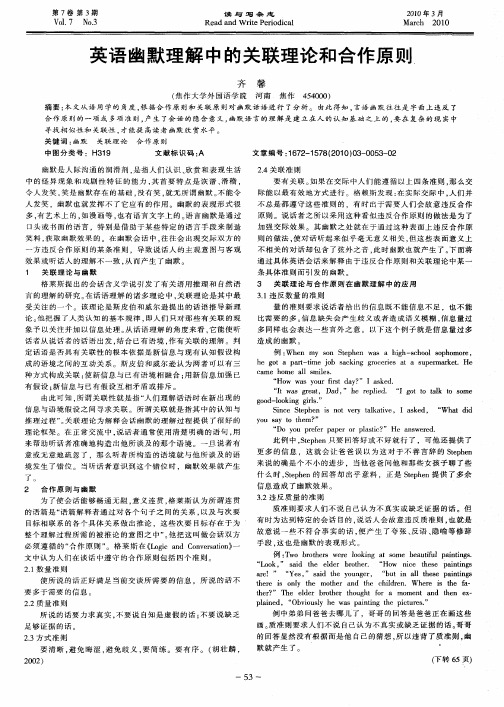
效果 或 听话 人 的理 解 不 一 致 , 而 产 生 了 幽 默 。 从
1
格 莱 斯 提 出 的会 话 含 义 学 说 引 发 了有 关 语 用 推 理 和 自然 语 言 的理 解 的研 究 。 话 语 理 解 的诸 多 理 论 中 , 联 理 论 是 其 中 最 在 关 受关 注 的一 个 。该 理 论 是 斯 皮 伯 和 威 尔 逊 提 出 的话 语 推 导 新 理 论 。 把 握 了人 类 认 知 的 基 本 规 律 , 他 即人 们 只对 那 些 有 关 联 的现
笑 料 , 取 幽 默 效 果 的 。 在 幽 默 会 话 中 , 往 会 出现 交 际 双方 的 获 往
一
不 总是 都 遵 守 这 些 准 则 的 ,有 时 出于 需 要 人 们 会 故 意 违 反 合 作 原 则 。 说话 者 之 所 以 采用 这种 看似 违反 合 作 原 则 的做 法 是 为 了
中的 怪 异 现 象 和 戏 剧 性 特 征 的 能 力 , 首 要 特 点 是 诙 谐 、 稽 , 其 滑
要 有关 联 。 如果 在 交 际 中人 们 能 遵 循 以上 四条 准 则 , 么 交 那
际 能 以 最 有 效 地 方式 进行 。格 赖 斯 发 现 : 实 际 交 际 中 . 们 并 在 人
河南
焦作
440 ) 5 0 0
摘 要 : 文从 语 用 学 的 角度 , 据 合 作 原 则 和 关联 原 则 对 幽 默 话 语 进 行 了 分析 。 由此 得 知 , 本 根 言语 幽 默 往 往 是 字 面 上 违 反 了 合 作 原 则 的一 项 或 多项 准 则 , 生 了会 话 的 隐含 意 义 , 产 幽默 语 言 的理 解 是 建 立在 人 的 认 知 基 础 之 上 的 , 在 复 杂 的 现 实 中 要 寻 找 相 似 性 和 关 联 性 , 能提 高读 者 幽默 欣 赏 水平 。 才
浅谈合作原则礼貌原则与关联理论
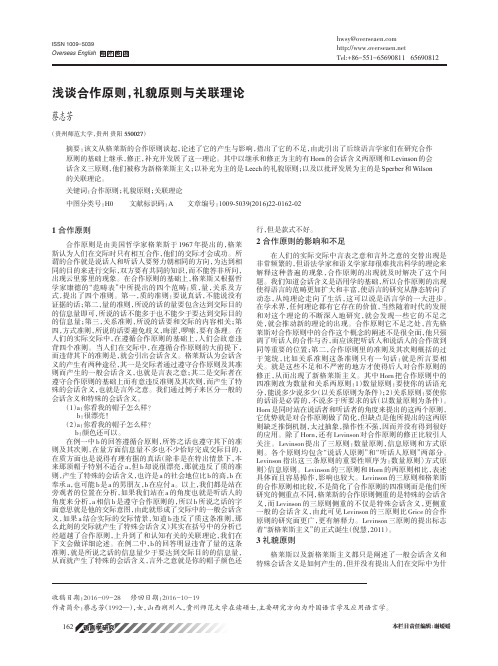
一一一一一一一一语言学研究本栏目责任编辑:谢媛媛浅谈合作原则,礼貌原则与关联理论蔡志芳(贵州师范大学,贵州贵阳550027)摘要:该文从格莱斯的合作原则谈起,论述了它的产生与影响,指出了它的不足,由此引出了后续语言学家们在研究合作原则的基础上继承,修正,补充并发展了这一理论。
其中以继承和修正为主的有Horn 的会话含义两原则和Levinson 的会话含义三原则,他们被称为新格莱斯主义;以补充为主的是Leech 的礼貌原则;以及以批评发展为主的是Sperber 和Wilson 的关联理论。
关键词:合作原则;礼貌原则;关联理论中图分类号:H0文献标识码:A文章编号:1009-5039(2016)22-0162-021合作原则合作原则是由美国哲学家格莱斯于1967年提出的,格莱斯认为人们在交际时只有相互合作,他们的交际才会成功。
所谓的合作就是说话人和听话人要努力朝相同的方向,为达到相同的目的来进行交际,双方要有共同的知识,而不能答非所问,出现云里雾里的现象。
在合作原则的基础上,格莱斯又根据哲学家康德的“范畴表”中所提出的四个范畴:质,量,关系及方式,提出了四个准则。
第一,质的准则:要说真话,不能说没有证据的话;第二,量的准则,所说的话的量要包含达到交际目的的信息量即可,所说的话不能多于也不能少于要达到交际目的的信息量;第三,关系准则,所说的话要和交际的内容相关;第四,方式准则,所说的话要避免歧义,晦涩,啰嗦,要有条理。
在人们的实际交际中,在遵循合作原则的基础上,人们会故意违背四个准则。
当人们在交际中,在遵循合作原则的大前提下,而违背其下的准则是,就会引出会话含义。
格莱斯认为会话含义的产生有两种途径,其一是交际者通过遵守合作原则及其准则而产生的一般会话含义,也就是言表之意;其二是交际者在遵守合作原则的基础上而有意违反准则及其次则,而产生了特殊的会话含义,也就是言外之意。
我们通过例子来区分一般的会话含义和特殊的会话含义。
浅谈合作原则和关联论引发的会话幽默
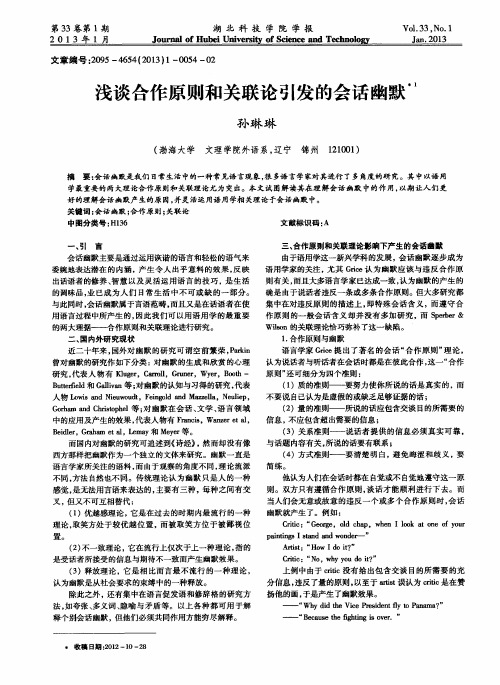
集中在对违反原则 的描述 上 , 即特 殊会话 含义 , 而 遵守 合 作原则 的一般 会话含 义却 并没 有多加 研究 , 而 S p e r b e r& Wi l s o n的关联理论恰巧弥补 了这一缺 陷。 1 . 合作原则与幽默 语言学家 G r i c e提 出了著 名 的会 话 “ 合 作原 则 ” 理论, 认为说话者与 听话者在会话 时都是在彼此合作 , 这一“ 合 作
人物 L o w i s a n d N i e u w o u d t ,F e i n g o l d nd a Ma z z e l l a ,N e u l i e p ,
G o t h a m nd a C h r i s t o p h e l 等; 对 幽默在会 话 、 文学 、 语 言 领域
西方那样把 幽默作为一个独立 的文体来研究 。幽默一直是
语言学家所关注 的语料 , 而 由于观察 的角度不同 , 理论流派
信息 , 不应包含超 出需要的信息 ; ( 3 )关系准贝 Ⅱ ——说话 者提 供 的信 息必 须真实 可靠 , 与话 题内容有关 , 所说 的话要有联 系 ; ( 4 )方式 准则—— 要清楚 明 白,避免 晦涩和歧 义 ,要
会话幽默主要是通过运用诙谐 的语 言和轻 松的语气来 委婉地表达潜在 的 内涵 , 产 生令 人 出乎 意料 的效 果 , 反 映 出话语者 的修 养 、 智 慧 以及灵 活运用 语言 的技 巧 , 是 生活 的调 味品, 业 已成为 人们 日常生 活 中不 可或 缺 的一部 分 。 与此 同时 , 会话 幽默属于言语范畴 , 而且又是在话语 者在使 用语 言过程 中所产 生 的, 因此 我们可 以用 语用 学 的最重要 的两 大理据——合 作原则和关联理论进行研究。
赵本山小品言语幽默的对比研究——合作原则和关联理论视角的考察

西南农业大学学报 ( 会科学版 ) 社
J ur a fSo t we tAg iut r lUni riy( o ilS inc iin) o n lo u h s rc lu a vest S ca ce eEdto
Vo1 1 NO.3 . 0,
要 的信 息 , 凸显 了宋 的淳朴 本质 , 却 一个 可爱 可亲 的
小 妇人 形象 跃然 纸上 , 人忍 俊不禁 。 让
2 违 反 质 的 原 则 而 产 生 幽 默 .
违反 量 的原 则 可 以分 为 两 类 : 供 了 比所 需 信 提
息相 对多 的 内容 ; 提供 了 比所需 信息 相 对少 的 内容 。 ( ) 反量 的第 一 准则 而产 生 幽默 1违
语 的 连贯 与衔 接 、 景 知 识 等 密 不 可 分 。但 是 合 作 背
原 则 与关 联理 论 对 言语 幽默 解 释 的 内在 机 制 不 同 。
的信 息 ; 2 所 说 的话 不应 超 出所需 要 的信 息 。 ()
质 的 准 则 : 1 不 要 说 自知 是 虚 假 的 话 ;2 不 要 () ()
合 作 原则 认 为 : 为使会 话顺 利进 行 , 人们 在交 际中总
要 遵 守 一 些 准 则 , 而 人 们 总 是 有 意 地 违 反 这 些 原 然 则 , 而 产 生 了 会 话 含 义 。 如 果 发 话 人 是 为 了 达 到 从
一
说缺 乏 足够证 据 的话 。
关 系准则 : 话要 有关 联 。 说 方 式 准 则 : 1 避 免 晦 涩 ; 2 避 免 歧 义 ; 3 简 () () ()
不可 分 _ 语 境 与 准 则 。在 日常 生 活 中 , 们 并 不 I 人 总是 遵 守 Gr e的 四个 准 则 。如 果说 话 人 一 方 的话 i c
合作原则和关联理论视角下的言语幽默
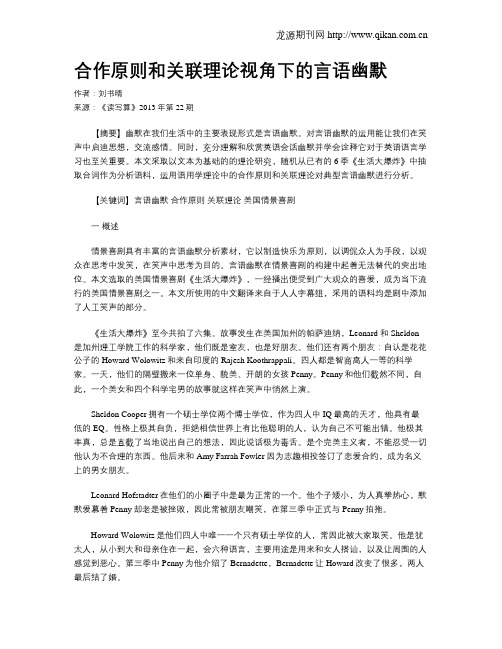
合作原则和关联理论视角下的言语幽默作者:刘书晴来源:《读写算》2013年第22期【摘要】幽默在我们生活中的主要表现形式是言语幽默。
对言语幽默的运用能让我们在笑声中启迪思想,交流感情。
同时,充分理解和欣赏英语会话幽默并学会诠释它对于英语语言学习也至关重要。
本文采取以文本为基础的的理论研究,随机从已有的6季《生活大爆炸》中抽取台词作为分析语料,运用语用学理论中的合作原则和关联理论对典型言语幽默进行分析。
【关键词】言语幽默合作原则关联理论美国情景喜剧一概述情景喜剧具有丰富的言语幽默分析素材,它以制造快乐为原则,以调侃众人为手段,以观众在思考中发笑,在笑声中思考为目的。
言语幽默在情景喜剧的构建中起着无法替代的突出地位。
本文选取的美国情景喜剧《生活大爆炸》,一经播出便受到广大观众的喜爱,成为当下流行的美国情景喜剧之一。
本文所使用的中文翻译来自于人人字幕组,采用的语料均是剧中添加了人工笑声的部分。
《生活大爆炸》至今共拍了六集。
故事发生在美国加州的帕萨迪纳,Leonard 和 Sheldon 是加州理工学院工作的科学家,他们既是室友,也是好朋友。
他们还有两个朋友:自认是花花公子的Howard Wolowitz和来自印度的Rajesh Koothrappali。
四人都是智商高人一等的科学家。
一天,他们的隔壁搬来一位单身、貌美、开朗的女孩Penny。
Penny和他们截然不同,自此,一个美女和四个科学宅男的故事就这样在笑声中悄然上演。
Sheldon Cooper拥有一个硕士学位两个博士学位,作为四人中IQ最高的天才,他具有最低的EQ。
性格上极其自负,拒绝相信世界上有比他聪明的人,认为自己不可能出错。
他极其率真,总是直截了当地说出自己的想法,因此说话极为毒舌。
是个完美主义者,不能忍受一切他认为不合理的东西。
他后来和Amy Farrah Fowler因为志趣相投签订了恋爱合约,成为名义上的男女朋友。
Leonard Hofstadter在他们的小圈子中是最为正常的一个。
宝洁官网中文版本土化策略的析论——合作原则与关联理论视角
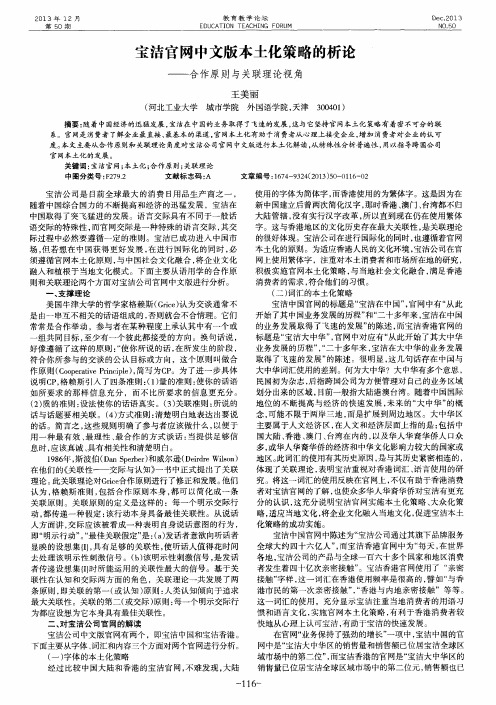
合作原则与关联原则
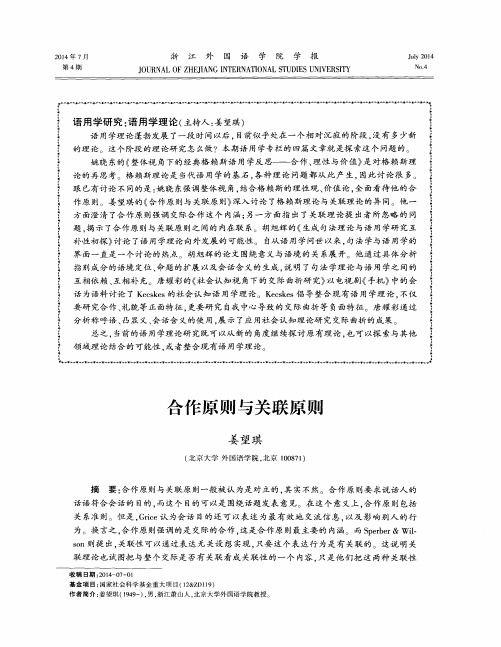
作 原 则。姜 望琪 的 《 合作 原 则与 关联原 则》 深入 讨论 了格 赖斯 理论 与 关联 理论 的异 同。他 一
语用学研究 : 语用学理论 ( 主持人 : 姜望琪)
语 用学理 论 蓬勃发展 了一段 时间 以后 , 目前似 乎 处在 一 个相 对 沉寂 的 阶段 , 没有 多少新 的理 论 这 个阶段 的理 论研 究怎 么做 ?本期 语 用 学专栏 的四篇 文 章就是探 索这 个 问题 的 。
姚 晓 东的《 整 体视 角 下的 经典格 赖 斯 语 用 学反 思— — 合 作 、 理 性 与价 值 》 是 对 格 赖 斯理
G r i c e在 1 9 6 7年提出 了著名 的语用学 原则—— 合 作原 则 , 至今 已快半个 世 纪 了。但 是 , 这 条原 则 到 底应 该怎么理解 , 却 一直争论不 断 m 。因为理 解不 同 , 人们对 它 的态度 也不 同 。有 不少人 支持 . 也 有很 多人 反对 。为此 , 本 文准备 以关联 原则为对立 面 , 剖析合作原则 的实质 内涵 , 以期 加深对 它的认识 。
界 面一直是 一 个讨 论 的热点 胡旭辉 的论 文 围绕 意义 与语 境 的 关 系展 开。他 通 过 具体 分 析
指别成 分 的语境 定位 、 命题 的扩展 以及 会话 含 义 的生成 , 说 明 了句法 学理 论 与语 用 学之 间的 互相依 赖 、 互相 补 充 。唐 耀 彩的 《 社会 认知视 角 下的 交 际 曲折研 究》以 电视 剧 《 手机》 中的 会
合作原则和关联理论对大学英语听力教学的促进
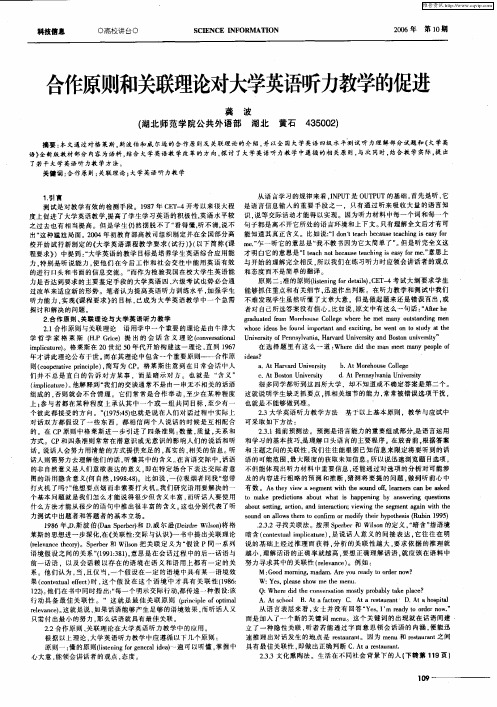
语 》 新 版 教 材 部 分 内容 为语 料 , 合 大 学英 语教 学 改 革 的 方 向 , 讨 了大 学 英 语 听 力 教 学 中遵 循 的相 关原 则 。 次 同 时 . 合 教 学 实 际 , 出 全 结 探 与 结 提 了 若干 大 学英 语 听 力教 学 方 法 。 关键词 : 作原则; 合 关联 理 论 ; 学 英语 听 力教 学 大
从 语 占学 习 的规 律 来 看 。N U I P T是 O P T的基 础 。 先 是 听 , UT U 首 它 测 试 是对 教 学 有 效 的 检 测 手 段 。 18 9 7年 C T 4开 考 以 来 很 大 程 是 语 言 信 息 输 人 的重 要 手 段 之 一 , 只有 通 过 听 来 吸 收 大 量 的 语 言 知 E一 说等交际活动 能得 以实现 。因为听力材料中每一个词和每一个 度 上促 进 了大 学 英 语 教 学 。 高 丁学 生学 习英 语 的 积 极 性 , 提 英语 水 平 较 识 . 只 之 过 去 也 有 相 当提 高 。但 是 学 生 仍 然 摆 脱 不 了 “ 得 懂 , 看 听不 清 . 不 句 子 都 是 离 不 开 它所 处 的语 言环 境 和 上 F文 。 有理 解 全 文 后 才 有 可 说
原 则二 : 准的原则(s n g o dt l , E 一 1t i r e i)C T 4考试 大纲要求学生 ie n f as 力是否达到要求的主要鉴 定手段的大学英语 四、 六级考 试也势 必会通 迅 过改革来适应新的形 势。笔者认为提 高英语 听力训练水平 , 强学 生 能 够抓 住 重点 和 有 关 细 节 , 速 作 出判 断 。在 听 力 教 学 和 测 试 中我 们 加 或 听力能力 , 实现 《 课程 要求》 目标 , 的 已成为大学 英语教学中一个急需 不 难 发 现 学生 虽 然 听 懂 了文 章 大 意 。但 是 做 起 题 来 还 是 错 误 百 出 ,
从合作原则和关联理论看模糊限制语

语, 反而会违反数量准则的第二次则 , 因为说话者所提供的信
息量 超 过 了听 话 者 所 要 求 的详 尽 程 度 。 如 : : a t ei in w A Wht m s t o ? i
BI Ab u e ’ l c . : o t n O c o k T B T n O co k t n tsa d f e s c n s 2: e ’ l c wo mi u e n v e o d . i
( ) 糊 限 制 语 的使 用 表 面 上 是 对 数 量 准则 的 违 反 , 一 模 实
质 上 遵 循 了数 量 准则
日常 生 活交 际 中 ,有 时 候 一 定 的信 息 量 就 可 以 满 足交 际 目的 , 不 需 要 十 分 精 确 的 信 息 量 。 这 种 情 况 下 使 用 模糊 限 并 在 制 语 不但 没有 违反 数 量 准 则 的第 一 次 则 , : 自己 所 说 的话 即 使 达 到交 际 目的所 要 求 的详 尽 程 度 。 反 , 果 不 使 用 模 糊 限 制 相 如
而 缓 和 型模 糊 限制 语 属 于 语 用 范 畴 .它不 改变 话 语 结 构 的原 意, 只表 达 说话 者对 话 题 所 持 的或 猜 测 或 保 留的 态 度 。 分 为 它 直 接 缓 和 语 Pa s it S i d lui ly he s和 间 接 缓 和 语 A tbt n bi l tiu o r i S id 。前 者 指 表 达 说话 者 本 人 对 话 题 或 猜测 或 怀 疑 态 度 的 he s I 词 语 ,如 : tik ; b lv … ; g es ;sfra Ik o Ihn … I ei e I us… a a s n w; e
o Sm , l s sme h tm r res后 者 指 限 制 变 动 范 围 , f O e a t o w a oeo s; mo , , l
论文写作 语言学方向
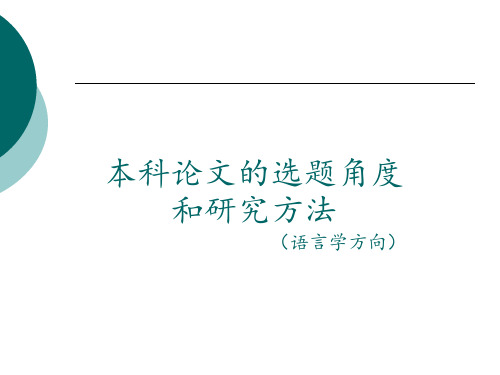
研究方法
2 、提问 由调查人员提出问题,要求受 访人回答,从中获取信息,采集资料。 提问的方式可以是直接的。 提问方式也可以是间接的。
研究方法
3、测验。测验的作用在于给受试人以某种刺激, 使其立即作出言语反应,以观察受试人的语言能 力,了解其语言体系的特定规则。测验的方式很 多,语言教学中常用的一些练习形式如看图说话, 变换句型,填补空缺,翻译句子等都可以试用。
选题要点
5. 观点要明确、正确 不好的选题: 1)美国英语与英国英语的优劣对比 修改:美国英语与英国英语的差异——从美国英语与英国英语的差异看两 民族的文化差异 2)副迁移对外语学习的作用 修改:如何克服外语学习中的副迁移——中国学生外语学习中的句法副迁 移及其对策 6. 避免纯理论研究 不好的选题: 合作原则与关联理论对比 修改:1)对合作原则的准则的藐视与幽默——马克?吐温幽默语言的合作 原则分析 2)关联与广告语言——关联与广告语言中的隐喻
研究方法
三、确定调查对象
对有关言语共同体中的每个成员都一一进行一番调 查又是不可能的。采用抽样调查是一个好办法。 抽样调查:按照一定的计算方法,从研究对象的总 体中,抽取部分单位作为研究的样本 ( 又叫抽样总 体)。通过抽样本中的个案,并以此部分单位的指标 数值去推断相关总体的指标数值。 这种方法既能避免无法全面调查的困难,又能节省 人力物力,达到认识总体的目的。而且可以依据概 率论的原理,求得抽样误差及其相应的概率保证度, 即抽样误差在一定范围内所对应的概率 (probability)。
研究方法
2、参与观察法(rapid and anonymous obserVation)这种方法是由拉博夫在调查前 述纽约市三家百货公司(r)的社会分层时首先使 用的,也是一种隐蔽观察的方法,调查人员不暴 露自己的身份。与上述观察法不同的地方在于: 调查人采用巧妙的诱导技巧,能不露真相地让被 观察者说出所需了解的语言变异形式,迅速地搜 集到有用的言语资料。
合作原则和关联理论视域下郭德纲相声中的言语幽默研究
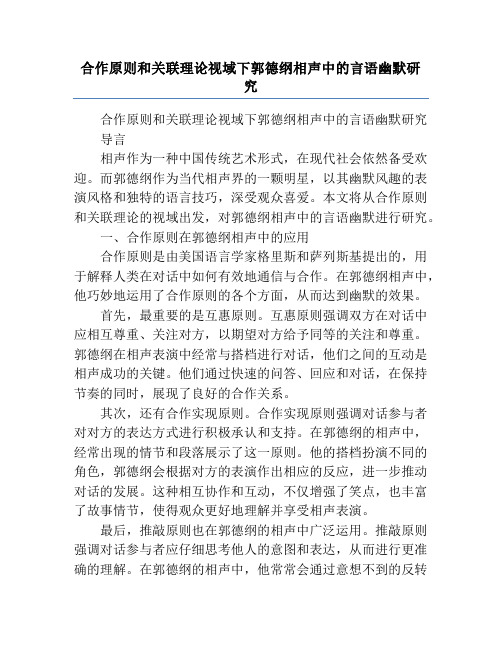
合作原则和关联理论视域下郭德纲相声中的言语幽默研究合作原则和关联理论视域下郭德纲相声中的言语幽默研究导言相声作为一种中国传统艺术形式,在现代社会依然备受欢迎。
而郭德纲作为当代相声界的一颗明星,以其幽默风趣的表演风格和独特的语言技巧,深受观众喜爱。
本文将从合作原则和关联理论的视域出发,对郭德纲相声中的言语幽默进行研究。
一、合作原则在郭德纲相声中的应用合作原则是由美国语言学家格里斯和萨列斯基提出的,用于解释人类在对话中如何有效地通信与合作。
在郭德纲相声中,他巧妙地运用了合作原则的各个方面,从而达到幽默的效果。
首先,最重要的是互惠原则。
互惠原则强调双方在对话中应相互尊重、关注对方,以期望对方给予同等的关注和尊重。
郭德纲在相声表演中经常与搭档进行对话,他们之间的互动是相声成功的关键。
他们通过快速的问答、回应和对话,在保持节奏的同时,展现了良好的合作关系。
其次,还有合作实现原则。
合作实现原则强调对话参与者对对方的表达方式进行积极承认和支持。
在郭德纲的相声中,经常出现的情节和段落展示了这一原则。
他的搭档扮演不同的角色,郭德纲会根据对方的表演作出相应的反应,进一步推动对话的发展。
这种相互协作和互动,不仅增强了笑点,也丰富了故事情节,使得观众更好地理解并享受相声表演。
最后,推敲原则也在郭德纲的相声中广泛运用。
推敲原则强调对话参与者应仔细思考他人的意图和表达,从而进行更准确的理解。
在郭德纲的相声中,他常常会通过意想不到的反转和丰富的联想,给观众带来意外和惊喜。
这种对意图的推敲,使得郭德纲能够捕捉住观众的注意力,并通过巧妙的言语技巧实现幽默效果。
二、关联理论在郭德纲相声中的运用关联理论是由加利福尼亚大学的普卢斯教授提出的,用于解释思维、语言和推理中的信息处理方式。
在郭德纲的相声中,我们可以看到他对关联的灵活运用。
首先,在关联的选择上,郭德纲能巧妙地选择与故事情节或对白相联系的关联词或主题。
通过这种关联,他能够带领观众从一个点引申到另一个点,产生出笑料。
从合作原则和关联理论看幽默话语
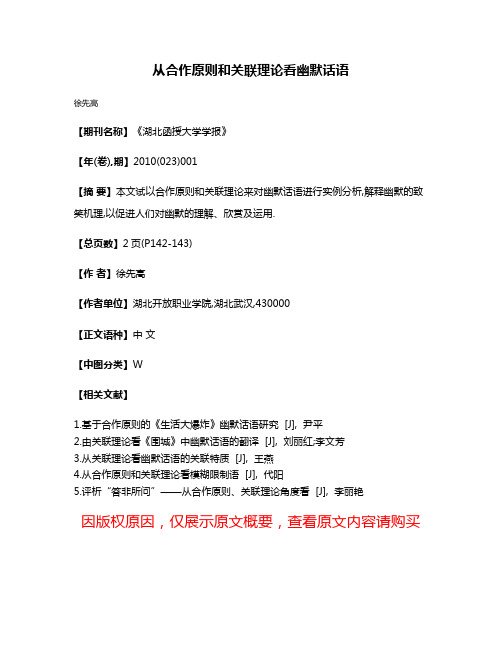
从合作原则和关联理论看幽默话语
徐先高
【期刊名称】《湖北函授大学学报》
【年(卷),期】2010(023)001
【摘要】本文试以合作原则和关联理论来对幽默话语进行实例分析,解释幽默的致笑机理,以促进人们对幽默的理解、欣赏及运用.
【总页数】2页(P142-143)
【作者】徐先高
【作者单位】湖北开放职业学院,湖北武汉,430000
【正文语种】中文
【中图分类】W
【相关文献】
1.基于合作原则的《生活大爆炸》幽默话语研究 [J], 尹平
2.由关联理论看《围城》中幽默话语的翻译 [J], 刘丽红;李文芳
3.从关联理论看幽默话语的关联特质 [J], 王燕
4.从合作原则和关联理论看模糊限制语 [J], 代阳
5.评析“答非所问”——从合作原则、关联理论角度看 [J], 李丽艳
因版权原因,仅展示原文概要,查看原文内容请购买。
- 1、下载文档前请自行甄别文档内容的完整性,平台不提供额外的编辑、内容补充、找答案等附加服务。
- 2、"仅部分预览"的文档,不可在线预览部分如存在完整性等问题,可反馈申请退款(可完整预览的文档不适用该条件!)。
- 3、如文档侵犯您的权益,请联系客服反馈,我们会尽快为您处理(人工客服工作时间:9:00-18:30)。
合作原则不关联理论之对比分 析
• 从六个方面对格氏合作原则和关联理论进行系统地对比,并对其差别进行评 价。
• 这六个方面分别是
1)the theoretical sources
(4)the defination of "meaning"; (5)the defination of "context" (6)the approaches to the interpretation of metaphor.
• 合作原则
• Grice sees conversation as a special case or variety of purposive and rational behavior. • he says in terms of Quantity, "If you are assisting me to mend a car, I expect your • contribution to be neither more nor less than is required". When“I need four screws, I expect you to hand me four, rather than two or six." • In terms of Quality,“I expect your contributions to be genuine and not spurious. If I need sugar as an ingredient in the cake you are assisting me to make, I do not expect you to hand me salt; if I need a spoon, I do not expect a trick spoon made of rubber". • In terms of Relation,“I expect partner's contribution to, be appropriate to immediate needs at each stage of the transaction; if I am missing ingredients for a cake, I do not expect to be handed a cook book, or even an oven cloth (though this might be an • appropriate contribution at a later stage)". • And in terms of Manner,“I expect a partner to make it clear what contribution he is making, and to execute his performance with reasonable dispatch".
•
Sperber and Wilson, however, make a distinction between "explicature" and "implicature", which .are different from the concepts of "saying" and "implicature" . They attach importance to explicit and the implicit side of communication and see "the explicit side of both the communication as richer, more inferential, and hence more worthy of pragmatic investigation than
2) the theoretical models;
3)the inferentical models
1. 理论渊源the theoretical resources:
• As a philosopher himself, Grice borrows to explain his cooperative principles from the German philosopher Immanuel Kant's four categories: quantity,quality, relation and manner. That is, he specifies the 'Cooperative Principle from these four aspects. •量的准则: 使你的言语行为含有所要求的信息 • 不要使你的言语信息超出所需求的信息 •质的准则: 不要讲你认为是错误的信息 • 不要讲你缺乏证据的信息 •关系准则: 要有关联性 •方式准则: 避免表述含糊不清 • 避免歧义 • 要简洁 • 要条理清晰
• 关联理论则是立足于认知、心理 及行为科学等领域的研究成果乊上的.其目的是构建一个相对具体 的认知模式 .
•
The proposal of Relevance Theory is inspired by Foder's theory of cognition. So their theory, different from Grice's Cooperative Principle, owes their origin to cognition.
• • • • • • •
2. 理论模式 the theoretical models
• • • • • • • • • • • First,The approaches they adopt to interpret verbal conversation is different. Second, the linguistic phenomena that they attempt to explain are different. 合作原则 Grice's theory is maxim-based. when we speak,we generally have something like the Cooperative Principle and its maxims in our mind to guide us, though sub--consciously, or even unconsciously. We will try to say things which are true, relevant, as well as informative enough, and in a clear manner. Hearers will also try to interpret what is said to them in this way. the Cooperative Principle can be seen as an attempt to explain how communication succeeds in the face of violation of the maxims. 试图解释违反合作原则的话诧是如何完成交际目的的.过分看重了对准则的违反的研究 关联理论 Relevance Theory, however, has no such maxim or principle. The focus of this theory is communication and cognition. It is neither ruled-based, nor maxim-based.It is clear that Sperber and Wilson want to use the principle of relevance to explain the rule of verbal communication: implications of utterances are acquired by inference. By doing that, they want it to replace Grice's explanation of utterance comprehension by the assumption of observing and violating the maxims. 假设“人类的认知是以关联为导向的,人类的交际活动和认知活动都是为了寻求关联
